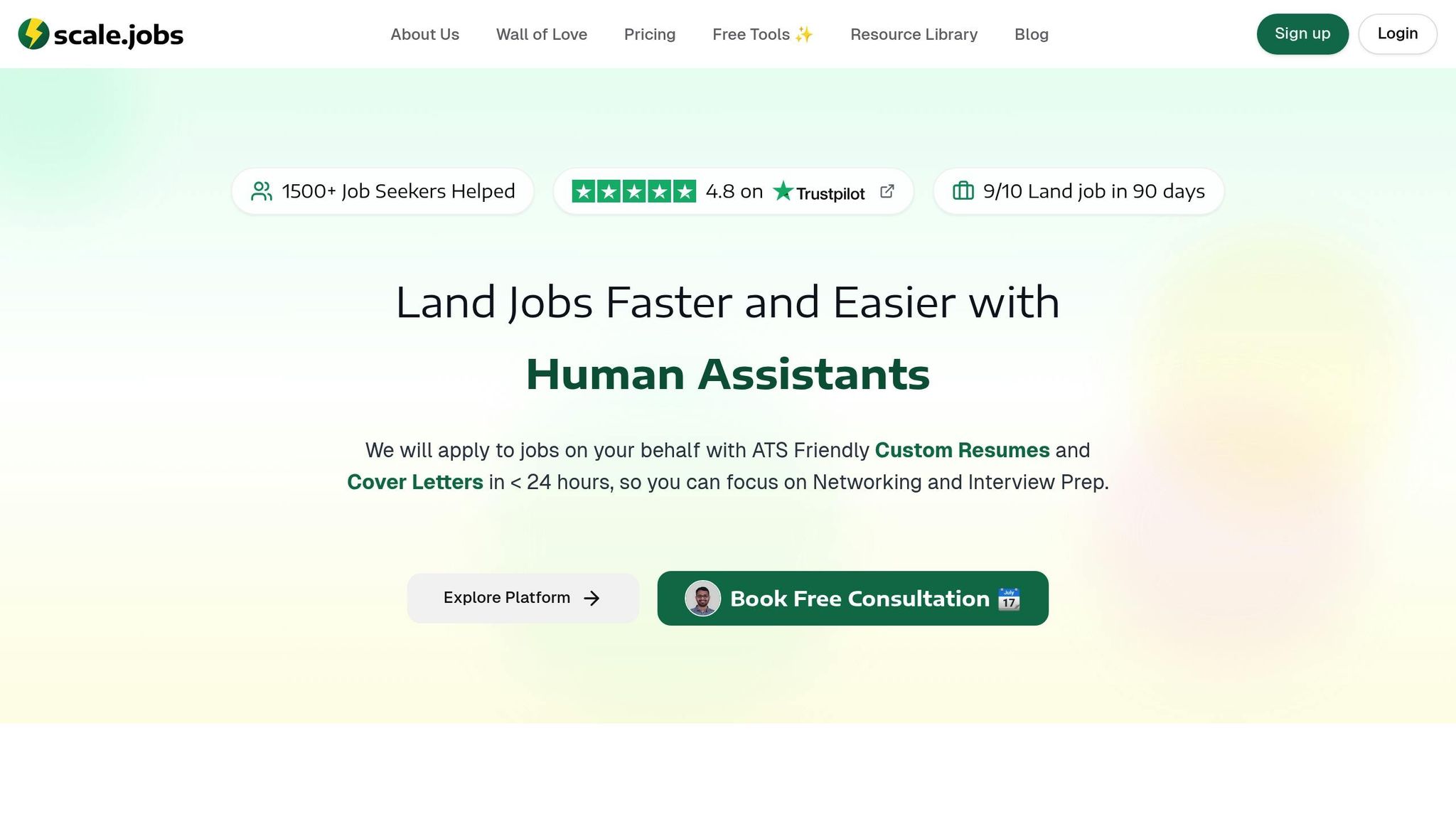How to Transition Into Energy Leadership Roles
Transitioning into energy leadership roles requires strategic planning, key skills, and effective networking to navigate a changing industry.

Energy leadership roles are high-level positions in the energy sector, requiring a blend of technical expertise, management skills, and industry knowledge. As the shift toward cleaner energy accelerates, professionals from diverse industries have opportunities to step into these roles. Here's what you need to know:
- Types of Roles: Opportunities exist in oil and gas, renewable energy, utilities, policy and regulation, and emerging technologies.
- Key Skills: Strategic planning, project management, regulatory knowledge, financial analysis, communication, and change management are essential.
- Who Can Transition: Engineers, finance experts, supply chain managers, consultants, and tech professionals can leverage transferable skills.
- Education and Certifications: Degrees in engineering, business, or energy-focused fields, along with certifications like Certified Energy Manager (CEM), are often required.
- Networking: Attend industry events, join associations, use LinkedIn, and find mentors to build connections.
- Job Search Tools: Platforms like Scale.jobs offer tailored resumes, ATS optimization, and application tracking, saving time and improving your chances.
How to Move from Technical Roles to Leadership in Energy Sector with Grant McKenzie. | Energy Sec...
Types of Energy Leadership Positions
The energy sector offers a wide array of leadership opportunities, each catering to unique focus areas and market needs. Understanding these roles can help professionals identify where their expertise and ambitions align.
Traditional Energy Leadership Roles
In long-standing industries like oil and gas, leadership often revolves around overseeing large-scale operations and ensuring compliance with industry standards. These positions demand a strong grasp of operational processes and market dynamics.
Renewable Energy Leadership
As the push for sustainable practices grows, renewable energy companies are blending conventional management approaches with forward-thinking sustainability strategies. Leaders in this area must juggle operational efficiency with the drive for greener innovations.
Utility Leadership Positions
Modern utility companies are integrating digital technology with traditional systems. Leaders in this space are tasked with maintaining infrastructure reliability, enhancing service quality, and navigating evolving regulations.
Energy Policy and Regulatory Leadership
In policy-focused roles, professionals have the chance to shape industry standards by combining technical know-how with regulatory insights. These positions play a key part in driving compliance and advancing energy initiatives.
Emerging Technology and Corporate Strategy Roles
The rapid pace of digital transformation is creating leadership opportunities centered on adopting new technologies to boost efficiency and fuel strategic growth. These leaders often oversee projects involving digital monitoring, data analytics, and corporate strategies aimed at supporting the clean energy transition.
Required Skills and Experience
Taking on leadership roles in the energy sector requires a mix of technical know-how and strategic management. Leaders in this field must navigate a maze of regulations, push for innovation, and oversee large-scale operations. These abilities are essential, especially when bringing expertise from other industries into the energy world.
Key Skills for Energy Leaders
Strategic Planning and Vision Development is at the heart of effective leadership. Energy leaders must anticipate shifts in the market, adapt to regulatory changes, and embrace technological advancements. Crafting long-term strategies that integrate renewable technologies and align with industry trends is a must.
Project Management Excellence is critical in an industry where projects often span years and involve diverse teams. Leaders need to ensure projects are completed on time and within budget, which directly impacts competitiveness.
Regulatory and Compliance Expertise is non-negotiable. A deep understanding of safety standards, environmental rules, and government policies allows leaders to make informed decisions while ensuring operations meet all legal and industry benchmarks.
Financial Acumen and Risk Management are vital for evaluating investments, managing costs, and navigating the unpredictable nature of energy markets. Strong analytical skills help leaders interpret financial data and make sound decisions, even in uncertain conditions.
Communication and Stakeholder Management play a key role in building relationships across the board - whether it's with investors, regulators, community leaders, or employees. Leaders must be able to explain complex ideas clearly, foster trust, and effectively manage diverse teams.
Change Management and Digital Transformation have become increasingly important as the energy industry evolves. Guiding organizations through digital transitions and adopting new tools to improve efficiency is now a core part of leadership.
How to Transfer Skills from Other Industries
Professionals from various fields can bring valuable expertise to the energy sector by building on the leadership skills outlined above.
- Engineering Professionals: Known for problem-solving and working with complex systems, they also bring experience with safety protocols.
- Finance and Investment Banking Professionals: Their strengths in financial analysis, risk assessment, and capital allocation are highly relevant.
- Operations and Supply Chain Managers: With experience managing intricate operations and vendor relationships, they add operational depth.
- Management Consultants: Strategic thinking, problem-solving, and stakeholder management are their standout skills.
- Technology and Software Professionals: As digital transformation reshapes the energy industry, their expertise is becoming increasingly indispensable.
Education and Certification Requirements
Formal education and certifications are essential for solidifying leadership credentials in the energy sector.
A strong educational background is often the starting point. Bachelor’s degrees in fields like engineering, business, finance, or economics provide the foundational knowledge needed to understand both technical and managerial aspects of the industry.
Advanced degrees and specializations can further boost leadership potential. Programs like MBAs with an energy focus or master’s degrees in energy management, environmental engineering, or public policy combine business acumen with industry-specific knowledge.
Professional certifications add another layer of credibility. Credentials such as Certified Energy Manager (CEM) highlight expertise in energy efficiency and management. Project management certifications are also highly valued for overseeing large-scale initiatives.
Continuing education and professional development are key to staying competitive in this rapidly changing field. Many professionals enhance their knowledge by joining industry associations, attending conferences, or enrolling in executive education programs. These efforts keep them up to date on the latest technologies, regulatory updates, and market trends.
Networking and Career Growth Methods
Building a strong network in the energy sector takes thoughtful planning. This industry’s unique combination of technical demands, regulatory challenges, and constant evolution presents plenty of opportunities for career growth - if you know how to navigate it.
How to Network in the Energy Industry
Industry conferences and trade shows are key to making connections in the energy world. Events like CERAWeek, WINDPOWER, and Solar Power International draw top leaders and decision-makers, including executives and startup innovators. These gatherings are excellent for meeting potential collaborators or mentors.
Professional associations are another great resource for networking. Groups like the American Association of Petroleum Geologists, IEEE Power & Energy Society, and the Association of Energy Engineers host local events, webinars, and certification programs. Being an active member not only builds your network but also boosts your credibility in specialized areas. Many of these organizations even provide access to exclusive job postings and mentorship programs.
LinkedIn outreach plays a big role in professional networking. In the energy sector, technical knowledge and industry insights are highly valued. To stand out, send personalized connection requests, engage with posts about key topics like renewable energy, grid updates, or sustainability, and share thoughtful comments that reflect your expertise.
Finding mentors can be made easier through formal programs. Major companies such as Chevron, ExxonMobil, and NextEra Energy often offer mentorship opportunities for both internal employees and external professionals. Industry associations also frequently match mentors and mentees based on career goals and areas of expertise.
Regional energy hubs like Houston and Denver provide concentrated opportunities for networking. These cities, along with other emerging energy centers in the U.S., host a variety of events - from casual meetups to structured panel discussions - that allow for meaningful, face-to-face connections.
By following these strategies, you can build a strong foundation for career growth. Networking not only enhances your reputation but also helps you develop the leadership skills needed to thrive in the energy sector.
Building Your Professional Reputation
Thought leadership is a powerful way to establish yourself in the energy industry. Publishing articles on platforms like Energy Central, Oil & Gas Journal, or Renewable Energy World can showcase your expertise. Focus on topics where you can provide unique insights, such as compliance issues, new technologies, or market trends.
Speaking opportunities at industry events can further boost your profile. Start small - like presenting at local chapter meetings or webinars - before aiming for larger conferences. Energy professionals value presentations that offer practical advice, case studies, or innovative solutions to common challenges.
Keep your LinkedIn and Twitter profiles polished. Many energy professionals use these platforms to discuss industry news, share insights, and connect with others. Posting content on topics like carbon capture or electricity markets can help you stand out as someone who knows their stuff.
Contributing to industry research is another way to build credibility. Whether it’s co-authoring white papers, participating in surveys, or collaborating with institutions like the University of Texas or the National Renewable Energy Laboratory, these activities can position you as an expert in your field.
Cross-functional collaboration within your current company can also highlight your leadership potential. Volunteering for projects that involve multiple departments - like engineering, operations, finance, or regulatory affairs - shows that you’re a team player with the skills to lead.
Once you’ve built your network and reputation, you can use specialized tools to turn those connections into career opportunities.
Using Scale.jobs for Energy Job Applications

For energy professionals aiming for leadership roles, Scale.jobs simplifies the job application process with tools tailored to the industry.
- Save time for networking: Scale.jobs’ human assistant service handles the time-consuming parts of applying for jobs, giving you back 20+ hours a week to focus on networking and career growth.
- Tailored, ATS-friendly resumes: They craft resumes specifically for each job, using industry-relevant keywords and formats to improve your chances of getting noticed by applicant tracking systems (ATS).
- Expert guidance on energy applications: With a deep understanding of energy sector hiring, Scale.jobs highlights key qualifications like certifications and project management experience to make your application stand out.
- Broad job board access: The platform pulls roles from major energy companies, startups, and niche job sites, offering a more comprehensive range of opportunities than you’d find on your own.
- Transparent updates: Real-time WhatsApp notifications and detailed progress reports keep you informed about your applications. Plus, their flat-fee pricing ensures cost-effective support as you navigate your career transition.
Common Transition Challenges and Solutions
Stepping into energy leadership roles comes with its own set of hurdles. From mastering the technical and regulatory aspects of the sector to gaining hands-on experience and ensuring your values align with a company's mission, having a clear plan can make all the difference. Below are practical approaches to tackle these challenges head-on.
Closing Knowledge Gaps
The energy sector demands a solid grasp of technical operations, regulatory policies, and the latest sustainability trends. To strengthen your expertise, explore professional development options like certification programs, executive education, or focused training sessions. These resources can help you stay ahead in a constantly evolving industry.
Gaining Energy Industry Experience
There's no substitute for real-world experience when it comes to energy leadership. Many professionals build this experience by working on energy-focused projects or taking on advisory roles. Whether through consulting, short-term contracts, or roles within industry organizations, practical exposure not only sharpens your skills but also expands your professional network - key for unlocking leadership opportunities.
Aligning Your Values with Company Goals
Beyond technical knowledge, aligning your personal values with a company’s mission is crucial for long-term success. Energy companies vary widely in their focus, from traditional operations to ambitious renewable energy goals. Research their approach to sustainability, innovation, and community engagement. Finding a workplace that resonates with your values ensures not only career growth but also a fulfilling professional journey.
Job Search Platforms Comparison
Finding the right job search platform is a key step for professionals aiming to transition into executive roles in the energy sector. For those pursuing leadership positions in this dynamic industry, having precise, human-assisted application support can make all the difference. Let’s explore how Scale.jobs compares to other platforms and why it’s particularly suited to the unique demands of energy leadership applications.
Scale.jobs vs Find My Profession vs Jobscan
| Feature | Scale.jobs | Find My Profession | Jobscan |
|---|---|---|---|
| Human-powered applications | ✅ Trained human virtual assistants manually handle every application | ❌ Primarily automated service | ❌ No full-service application management |
| ATS optimization | ✅ ATS-optimized documents | ✅ Offers professional resume services | ✅ Focuses on ATS scanning and optimization |
| Pricing model | ✅ Flat-fee pricing with campaign bundles (starting at $199) | ❌ Premium pricing with recurring fees | ❌ Subscription-based pricing |
| Real-time updates | ✅ Live WhatsApp updates with proof-of-work screenshots | ❌ Standard email updates | ❌ No dedicated application tracking |
| Industry specialization | ✅ Serves all industries - including specialized energy leadership roles | ✅ Caters broadly to executive roles | ❌ Primarily focused on resume enhancement |
| Transparency | ✅ Transparent process with proof-of-work screenshots | ❌ Process visibility is limited | ❌ Lacks full application process transparency |
Why Scale.jobs Works Better
Scale.jobs stands out by offering human-assisted application management, a critical advantage when applying for complex energy leadership roles. Unlike platforms that rely heavily on automation, Scale.jobs assigns trained virtual assistants to handle applications, ensuring attention to technical and role-specific details.
The platform also provides ATS-optimized documents tailored to meet the specific requirements of various applicant tracking systems. With energy companies using diverse ATS platforms, this customization can be the deciding factor between landing an interview or being filtered out. This is especially important in an industry spanning traditional oil and gas roles to emerging renewable energy opportunities.
Another major benefit is Scale.jobs' flat-fee pricing model. Unlike subscription-based or recurring fee services, Scale.jobs offers a one-time payment option, making it a cost-effective solution for professionals who want comprehensive application support without ongoing financial commitments.
Additionally, Scale.jobs is compatible with all job portals, ensuring your applications reach their destination - whether through large corporate ATS systems or niche energy job boards. This flexibility helps you stay competitive in the energy sector’s diverse job market. Combined with focused tools and features, Scale.jobs simplifies the job search process for energy professionals aiming for leadership roles.
Getting the Most from Job Search Tools
Maximizing the tools offered by Scale.jobs can significantly enhance your job search strategy. Here are a few tips to get started:
- Leverage human support: Use the platform’s human virtual assistants to handle application submissions, freeing up your time to focus on networking and refining your approach.
- Utilize free tools: Take advantage of features like the ATS checker, salary predictor, and interview question predictor to sharpen your applications and interview preparation.
- Target quality opportunities: Focus on roles that align with your expertise. Scale.jobs’ tailored, ATS-optimized resumes and cover letters can help highlight your strengths for specific positions.
- Network strategically: While your virtual assistant manages applications, build connections with energy industry professionals to increase your visibility and potential opportunities.
- Monitor your progress: Use the built-in application tracker to stay on top of your job search. With custom documents ready within 24 hours, Scale.jobs ensures you never miss tight deadlines.
Conclusion: Your Path to Energy Leadership
Stepping into a leadership role in the energy sector takes a mix of expertise, industry knowledge, and a strategic approach to your job search. This sector is rich with opportunities for professionals who are ready to dive into both traditional energy systems and the rapidly growing world of renewable technologies.
To build a strong foundation, you’ll need to hone core leadership skills alongside specialized energy industry knowledge. While technical abilities like project management, regulatory compliance, and sustainability planning are crucial, it’s often the soft skills - like managing stakeholders and thinking strategically - that set exceptional leaders apart.
Networking is a cornerstone of this journey. Attending energy industry events, joining professional associations like the American Association of Petroleum Geologists or the American Wind Energy Association, and engaging in LinkedIn groups can open doors to valuable connections. These relationships often provide insider insights into leadership opportunities and industry trends. Platforms like Scale.jobs can further streamline your job search by matching you with the right openings.
When it comes to applying for leadership positions, precision is key. Generic applications won’t cut it in this competitive field. Energy companies often use advanced applicant tracking systems (ATS), so tailoring your resume to each role is essential. Scale.jobs offers a human-powered, ATS-optimized service that highlights your leadership skills effectively. Starting at $199 with a flat-fee pricing model, this service avoids subscription costs while offering comprehensive application support.
By using Scale.jobs, you can save over 20 hours a week, giving you more time to focus on networking and preparing for interviews. Their real-time WhatsApp updates and proof-of-work screenshots ensure you’re always in the loop.
The energy sector’s diversity - from traditional oil and gas to renewable energy startups - demands a flexible approach to job applications. Scale.jobs’ compatibility with all major job portals ensures your applications reach the right places, whether through corporate ATS systems or niche energy job boards.
Success in energy leadership relies on consistent effort across several areas: continuous learning, strategic networking, and well-managed applications. By staying committed to these priorities, you can position yourself for a rewarding leadership role in this dynamic industry.
FAQs
What’s the best way to gain experience in the energy sector if I’m transitioning from another industry?
Transitioning to the energy sector from a different field can open up exciting possibilities. To get started, focus on identifying skills from your current role that are relevant to energy jobs. Abilities like project management, leadership, or technical know-how often translate well. To strengthen your profile, consider earning certifications or completing courses in areas like renewable energy, energy management, or sustainability. These can help you build expertise and demonstrate your commitment to the field.
Networking plays a huge role in making this shift. Engage with energy professionals on LinkedIn, attend industry events, or join local meetups. Becoming part of energy-focused organizations or groups can also provide valuable insights and connections. If you're actively looking for opportunities, platforms such as scale.jobs can be a game-changer. They offer tools like ATS-friendly resume templates and AI-driven features to streamline your job applications, giving you a better shot at landing interviews.
How can I ensure my personal values align with the mission of energy companies when pursuing leadership roles?
Aligning your personal values with the objectives of energy companies takes careful consideration. Start by digging into the company's mission, vision, and any sustainability programs they highlight. This will give you a clearer picture of their priorities. Then, take some time to reflect on your own values - whether it's a focus on environmental care, driving innovation, or creating a positive social impact - and look for areas where your principles align with theirs.
When you're in interviews or networking discussions, ask specific questions about the company's culture, leadership style, and how they approach ethical decision-making. These conversations can reveal whether their mindset matches your values. Additionally, connecting with current employees on platforms like LinkedIn can provide firsthand insights into the company's day-to-day practices and whether they align with what matters most to you.
What certifications or advanced degrees can help me qualify for leadership roles in the energy sector?
Certifications and advanced degrees can play a big role in setting you apart for energy leadership roles. Industry-recognized certifications like Certified Energy Manager (CEM), Project Management Professional (PMP), or LEED Accredited Professional are often seen as strong assets. When it comes to advanced degrees, programs such as a Master’s in Energy Management, Environmental Engineering, or an MBA with a focus on sustainability or energy can give you an extra edge.
On top of formal education, leadership positions typically demand a mix of technical know-how and strategic insight. To round out your qualifications, consider engaging in networking events or professional development programs. These can help you stay on top of industry trends and connect with influential figures in the energy sector.




